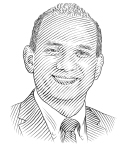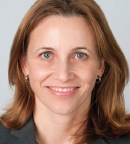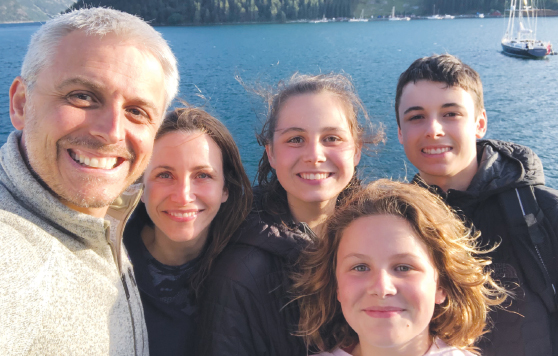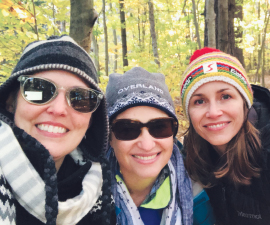For this installment of the Living a Full Life series, guest editor Jame Abraham, MD, FACP, spoke with Tatiana M. Prowell, MD, who currently serves as Associate Professor of Oncology in the Breast Cancer Program at the Johns Hopkins Kimmel Comprehensive Cancer Center and as a Medical Officer and Breast Cancer Scientific Liaison at the U.S. Food and Drug Administration (FDA).

Jame Abraham, MD, FACP
Dr. Prowell took a long and circuitous road to medicine. “Throughout high school and until midway through my junior year in college, I was intent on pursuing a career in literature and writing. No one in my family was a doctor, and growing up, I certainly had no intention of going to medical school. When I was in elementary school, my great-grandmother, to whom I was very close, had a stroke and was left with multiple neurologic deficits. I spent a lot of time by her bedside, and I remember several relatives commenting that I’d probably end up being a nurse. But other than that early companion experience, I don’t think a career in health care ever crossed my mind,” said Dr. Prowell.
GUEST EDITOR
Dr. Abraham is the Director of the Breast Oncology Program at Taussig Cancer Institute, and Professor of Medicine, Lerner College of Medicine, Cleveland Clinic.She continued: “During my first year of college, my mother was diagnosed with lymphoma. She was in Georgia, where I grew up, and I was at Bard College in upstate New York. When I asked whether I should come back home, she said that would make her feel that things were serious, so I should stay in New York. Her experience made me realize that people with cancer require not only great science, but also great compassion and communication, to thrive after their diagnosis. I have no doubt that her illness planted the seed in my mind to become an oncologist. Bard is a small liberal arts college and, for better and worse, had a lot of flexibility in terms of graduation requirements, so I had focused entirely on humanities courses, to the exclusion of all science or math courses, for my first two and a half years there.”

Tatiana M. Prowell, MD
An Insightful Advisor
Dr. Prowell’s career trajectory changed suddenly in her third year of college. She went to meet formally with her advisor, Clark Rodewald, who had been paraplegic for many years after a car accident. “I was very close to Clark. I had taken many classes with him, including one-on-one tutorials, and we spent time together talking almost every day. I was preparing to leave for my spring semester of junior year abroad in Prague. I went to say goodbye and discuss what he thought I should do after graduation. He said, ‘You’re not going to like this, but I really think you should become a doctor.’ I was stunned and frankly kind of upset. I was asking for his thoughts on PhD programs in literature. Being told to go to medical school was not the career advice I expected or wanted.”
TATIANA M. PROWELL, MD
Why a career in oncology?“I was drawn to the intensity of the patient-clinician interaction and the potential to translate our increasingly sophisticated scientific understanding into improved outcomes for patients.”
On Dr. Doug Smith, who led her to a career in oncology: “He was a very talented scientist but also a warm and intuitive clinician and teacher.”
Words of advice: “Don’t be afraid. Fear is limiting. It’s bad for our mental health, it damages relationships, and it hinders progress. Don’t be afraid.”
For a couple of days, Dr. Prowell stewed over her advisor’s drastic advice, and then she went back to talk to him again. “He told me that, in the decades since his accident, he had spent a lot of time in the company of physicians and that I reminded him of a few who had really mattered to him. Listening to him articulate his reasons for the advice, I guess you could say I had an ‘aha’ moment. I cancelled my semester abroad and went to the science department to figure out what my options were with just three semesters remaining before graduation. They supported my continued focus on languages and literature, including for the thesis that Bard requires of all undergraduates, but constructed a schedule that allowed me to complete in three semesters all of the science and math courses I needed for the MCAT and medical school applications,” said Dr. Prowell.
When asked to dig a little deeper into Professor Rodewald’s belief that she should become a doctor, Dr. Prowell responded: “I think he appreciated that I was curious and inclined to fix things and that I truly loved both people and their stories, all of which are fundamental to medicine. He knew me well as both a student and a friend and believed that I would be really happy as a physician. And he was right.”
Dr. Prowell emphasized that her relationship with her advisor fueled her desire to mentor students and trainees herself. “Had I not had the close relationship with Clark, I don’t think I ever would have ended up a physician. And I still get to mentor and teach. I have been fortunate to teach many physicians in training, both at Hopkins and in courses like the Vail Workshop, where the classes are filled with passionate learners. I was one of those people who fell in love with every class and every rotation, so I can relate to the trainees who don’t want to differentiate and close any doors. Although I would have been content in many disciplines, I found myself gravitating to the specialties that challenged me most, both intellectually and emotionally. I especially enjoyed critical care, transplant surgery, and oncology. Ultimately, I settled on oncology because I was drawn to the intensity of the patient-clinician relationship and the potential to translate our increasingly sophisticated scientific understanding into improved outcomes for patients.”
Career-Changing Mentors
After graduating from Bard College with a BA in literature and languages, Dr. Prowell entered Johns Hopkins University School of Medicine in Baltimore to pursue her medical degree. “Attending Johns Hopkins for my medical training was an extraordinary experience. I felt like everywhere I looked, from my classmates to the full professors, I was surrounded by people I admired and wanted to emulate.
“A few people stand out as particular role models. Chris Sonnenday, MD, MHS, who was a surgical resident a couple of years ahead of me in training and is now Professor of Transplant Surgery at the University of Michigan, was exactly the type of doctor I wanted to become. He was brilliant yet humble and meticulous about the well-being of his patients and his team. Even when exhausted, he always looked sincerely honored to have been asked for help, whether at a patient’s bedside or in the operating room. He is both the ultimate doctor’s doctor and the ultimate patient’s doctor. It’s been almost 2 decades, and honestly, I’m still trying to become more like him. I think everyone who knows him feels the same way,” said Dr. Prowell.
She continued: “Doug Smith, MD, who is Professor of Oncology at Johns Hopkins, gets almost all of the credit for my deciding on oncology in particular. I happened to have rotated on the inpatient leukemia service with him. He was a very talented scientist but also a warm and intuitive clinician and teacher—one of those people who makes you want to do whatever they do.”
Dr. Prowell was given permission by the widow of a patient to share a story from her inpatient rotation with Dr. Smith. “When we were on service together, there was a man in his early 20s with acute myeloid leukemia and a very poor prognosis. He had an infant daughter with the woman he was dating, and then suddenly came this devastating diagnosis out of the blue. The whole inpatient team—Dr. Smith, me, the nursing staff, the social workers—helped plan a beautiful wedding for our patient and his fiancée, which took place in a courtyard outside Johns Hopkins. It was actually on Dr. Smith’s own wedding anniversary, so he and his wife spent their anniversary together at our patient’s wedding. Over the course of a day, Dr. Smith and I discussed the complex, molecular underpinnings of this young man’s ultimately fatal leukemia and then attended a wedding that we had helped to plan to honor one of his dying wishes. It was that experience, more than anything, that convinced me oncology was real doctoring. I was hooked.”

Dr. Prowell with her husband, Dr. Todd Gleeson, and their three children on a fjord cruise in Norway.
Designing Trials That Serve Patients
Dr. Abraham asked Dr. Prowell how a clinician so passionate about patient care ended up working at the FDA. She responded: “Working at FDA provides an opportunity to improve patient outcomes at a higher level, by helping to design better clinical trials and get effective drugs more quickly to people who need them. At the heart of that work for me is a desire to serve people living with cancer in as many ways as possible.”
Dr. Prowell shared her own experience as a participant in three clinical trials. “I have fortunately been in good health, but I wanted to be in a clinical trial to figure out how trials could be done better. During my first year of fellowship, when I was pregnant with my first child, I saw a flyer in obstetrics at Johns Hopkins for a trial seeking healthy pregnant women, so I enrolled. I thought the experience was valuable enough that I enrolled in two more trials in subsequent pregnancies. Having been in trials myself led me to view protocols differently, making sure that every burden, every risk, every test, every questionnaire we ask participants to take on is justified. If you design clinical trials, you should really enroll in one. You’ll never look at a protocol or informed consent form in the same way again.”
When Patients and Families Care for Us
How does a super-busy physician decompress? “The thing I do most consistently to decompress is mindfulness meditation. I credit the husband of a patient for that practice. Several years ago, I was having a particularly stressful day. During clinic that afternoon, I met with a patient and her family for the first time. She had a very complicated situation, and while we talked, my pager was beeping, people were knocking on the door, and it felt impossible to devote proper attention to anything, most importantly this frightened family sitting in front of me. At the end of the visit, her husband thanked me and then, with his hand on the door, said that he was worried about me. He said, ‘You need to slow down. The only place you’re going to get yourself rushing like that all day is somewhere I suspect you’re in no hurry to go.’ He was a mindfulness meditation teacher and suggested that I try it as a way to learn how to be still, both in body and mind.”
Dr. Prowell was so impressed by his courage and kindness in offering the advice that she felt obliged to give it a try. “So, I signed up for a free class one evening near my home, and you know what? He was right. It took real discipline to learn how to be still—to stop running the to-do list, ruminating on the past, mapping out the future, and just be in the present—but it completely changed my life. Mindfulness meditation has helped me feel more at peace internally, regardless of what may be happening externally.”

Dr. Prowell with her two best friends, Kira Sloop and Dawn Mattoon, hiking in Maine.
Dr. Prowell said that her family also provides a welcome balance to the rigors of oncology. “My husband, Todd, is such a generous partner. He is also a doctor, so he gets it. Our three kids seem to be perpetually at busy ages, and we are both very involved parents. We love the shared work of our family, and we also carve out time for each other. I feel happy every time he walks through the door, and we take long walks together almost every day, no matter what. If we’re both in town, we make space to connect with each other and disconnect from the rest of the world. It resets both of us.”
In her free time, you can usually find Dr. Prowell outside hiking, skiing, traveling, and taking photos. She added that she has never stopping loving literature and schedules a few hours every weekend to lie in bed reading. What does she read? “Everything I can get my hands on. It may be a novel, nonfiction, The New Yorker, The Atlantic, The New York Times…. It’s usually not medicine, at least during that time. “Everyone in my house will tell you ‘unless the house is on fire, she’s staying in bed reading for the next few hours.’”
‘Don’t Be Afraid’
Dr. Abraham asked Dr. Prowell to give a bit of insight into her social media presence, noting that she speaks forthrightly about controversial issues such as race and gender inequality, gun violence, the antivaccination movement, and youth vaping. “Let me start by saying that I make it clear I speak for no one but myself. My Twitter account is personal. That being said, I tweet mostly about public health, and every one of those issues is directly related to public health, so I think they’re all relevant. I also try to speak up on behalf of people who are commonly silenced or unheard. I have tremendous privilege being white, born in the United States, able-bodied, educated, et cetera. So, I can afford to say some things that not everyone feels safe saying. I think that comes with an obligation to use that privilege, most of which is completely unearned, for good.”
We asked Dr. Prowell for one piece of advice she would give to everyone. She replied without hesitation, “Don’t be afraid. Fear is limiting. It’s bad for our mental health, it damages relationships, and it hinders progress. Don’t be afraid.” ■
DISCLOSURE: Dr. Prowell reported no conflicts of interest.

